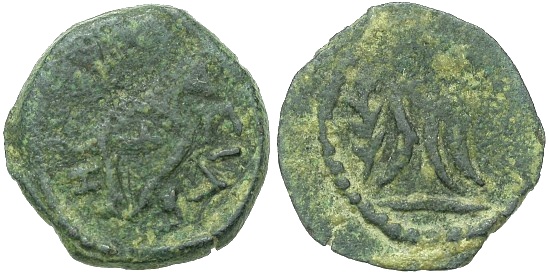
 |
Freethought & Rationalism ArchiveThe archives are read only. |
|
|
#11 | |
|
Veteran Member
Join Date: Mar 2009
Location: England
Posts: 2,527
|
Quote:
 JD55685. Bronze 2 prutot, Hendin 1178a, RPC I 4905 var (closed diadem), aVF, Jerusalem mint, weight 3.576g, maximum diameter 19.6mm, die axis 0o, obverse ΗΡΩ∆ΟΥ ΒΑΣΙΛΕΩΣ (of King Herod), cross surrounded by open diadem; reverse tripod table, flat object upon it, flanked by palm branches; $90.00 http://www.forumancientcoins.com/cat...ns.com/Coins2/ |
|
|
|
|
|
#12 |
|
Veteran Member
Join Date: Jun 2010
Location: seattle, wa
Posts: 9,337
|
Yes I am well aware of these coins (none ever say 'King of the Jews' interestingly). But is the sharp distinction between 'tetrarch' and 'king' real or something cultivated by our over-reliance on Josephus? In other words can a tetrarchy have a 'king'?
|
|
|
|
|
#13 | ||
|
Veteran Member
Join Date: Jun 2010
Location: seattle, wa
Posts: 9,337
|
There is for instance some discussion that the confusion over the term 'tetrarch' and 'tetrarchy' derives from the system of government imposed on the Gauls by Julius Caesar.
Quote:
Quote:
|
||
|
|
|
|
#14 | |
|
Veteran Member
Join Date: Jun 2010
Location: seattle, wa
Posts: 9,337
|
Here is the section from Strabo's Geography that has puzzled scholars for generations:
Quote:
|
|
|
|
|
|
#15 | ||
|
Veteran Member
Join Date: Mar 2009
Location: England
Posts: 2,527
|
Quote:
 Tetrarchy TetrarchyQuote:
As to "king of the Jews' - it would have been the height of insensitivity to the Jews for Herod to claim that title for himself. The event of 37 b.c. and the execution of Antigonus - why court further trouble with the Jews...?? |
||
|
|
|
|
#16 | ||
|
Veteran Member
Join Date: Jun 2010
Location: seattle, wa
Posts: 9,337
|
Yes but who can trust Josephus. Scholarship is too trusting of Josephus. Antiquities says that Glaphyra after Alexander was killed by Herod ultimately married her father and then her mother appeared in a dream to the father before he died (if memory serves me correctly). There are just too many silly stories to make any of this credible.
Let's consider the example of Archelaus of Commagne for a moment. Was he a 'king' of 'tetrarchy'? Here is what Strabo says: Quote:
Quote:
|
||
|
|
|
|
#17 | |
|
Veteran Member
Join Date: Jun 2010
Location: seattle, wa
Posts: 9,337
|
Here's the stupid story in Josephus that ends Book Seventeen:
Quote:
|
|
|
|
|
|
#18 | |
|
Contributor
Join Date: Feb 2006
Location: the fringe of the caribbean
Posts: 18,988
|
Quote:
You are going to double-check what you just said?? What else did you say that you did NOT double check?? Your posts are extremely disturbing to me. I may need to double check every thing you ever said on this forum. |
|
|
|
|
|
#19 | |
|
Veteran Member
Join Date: Jun 2010
Location: seattle, wa
Posts: 9,337
|
Apparently Archelaus's territory of Comana was given to his wife Pythodoris and ultimately expanded:
Quote:
|
|
|
|
|
|
#20 | ||||
|
Veteran Member
Join Date: Jun 2010
Location: seattle, wa
Posts: 9,337
|
It would seem that Strabo never calls Archelaus 'king' nor his territory a 'kingdom' but Josephus consistently does the opposite - i.e. in Josephus he is 'king Archelaus of Cappadocia' and his territory a kingdom.
More references to Archelaus in Strabo Geography book 12: Quote:
Quote:
Quote:
Quote:
|
||||
|
|
| Thread Tools | Search this Thread |
|